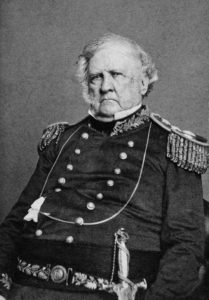Good morning, Whitewater.
Halloween in town will be partly cloudy with a high of fifty-nine. Sunrise is 7:29 AM and sunset 5:47 PM, for 10h 17m 50s of daytime. The moon is new today, with just .4% of its visible disk illuminated.
On this day in 1861, Winfield Scott steps down:
This picture of Lieut. Gen. Winfield Scott was made at West Point, N.Y., June 10, 1862. The subscribers claim that, for correctness of portraiture, finish and detail, it is pre-eminently the best portrait of the Great American Military Chieftain. Via Wikipedia.
Citing failing health, General Winfield Scott, commander of the Union forces, retires from service on this day in 1861. The hero of the Mexican War recognized early in the Civil War that his health and advancing years were a liability in the daunting task of directing the Federal war effort. Scott was born in Virginia in 1786. He graduated from William and Mary College and joined the military in 1808; he had become the youngest general in the army by the end of the War of 1812.Scott was an important figure in the development of the U.S. Army after that war, having designed a system of regulations and tactical manuals that defined the institution for most of the 19th century. Although Scott’s tactics, many of which were borrowed from the French, were of little use in the irregular warfare the army waged against the Seminoles and Creek in the southeast, his methods worked brilliantly during the war with Mexico in 1846 and 1847.
His campaign against Mexico City, in particular, is remembered for the strength of its planning and execution. During the secession crisis of 1861, Scott remained at his post, refusing to join his native state in abandoning the union. Scott was asked by U.S. President Abraham Lincoln to devise a comprehensive plan to defeat the Confederacy.
The strategy Scott developed called for the blockading of ports to isolate the South economically, to be followed by an offensive down the Mississippi River. In the optimistic early days of the war, this strategy seemed hopelessly sluggish—in fact, critics dubbed it the “Anaconda Plan” after the giant Amazonian snake that slowly strangles its prey. Despite this initial criticism, it was the basic strategy that eventually won the war for the Union.
Scott also drew criticism for ordering the advance of General Irwin McDowell’s army into Virginia, which resulted in the disastrous Union defeat at the First Battle of Bull Run on July 21, 1861. With the arrival of George McClellan as commander of the Army of the Potomac shortly after, Scott’s influence waned. He weighed over 300 pounds, suffered from gout and rheumatism, and was unable to mount a horse.
His resignation on October 31 did not end his influence on the war, however. Lincoln occasionally sought his counsel, and many of his former officers commanded forces and executed the same maneuvers that he had used in Mexico. Scott retired to West Point to write his memoirs and died in 1866.
On this day in 1968, the Bucks win their first game:
On this date the Milwaukee Bucks claimed their first victory, a 134-118 win over the Detroit Pistons in the Milwaukee Arena. The Bucks were 0-5 at the time, and Wayne Embry led Milwaukee with 30 points. Embry became the first player in Bucks history to score 30 or more points in a regular season game. [Source: Milwaukee Bucks]
JigZone‘s puzzle for today is of a buckle:

